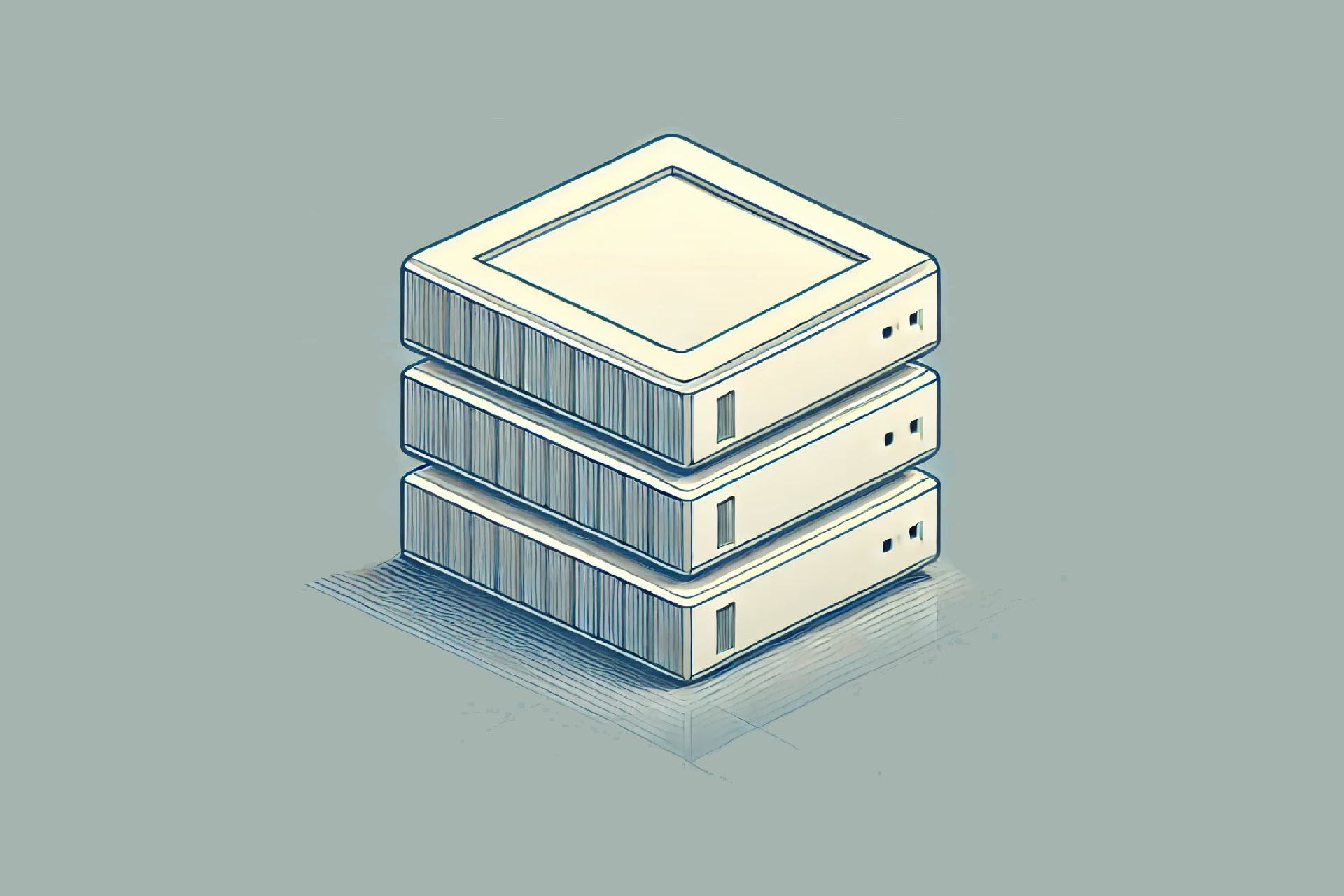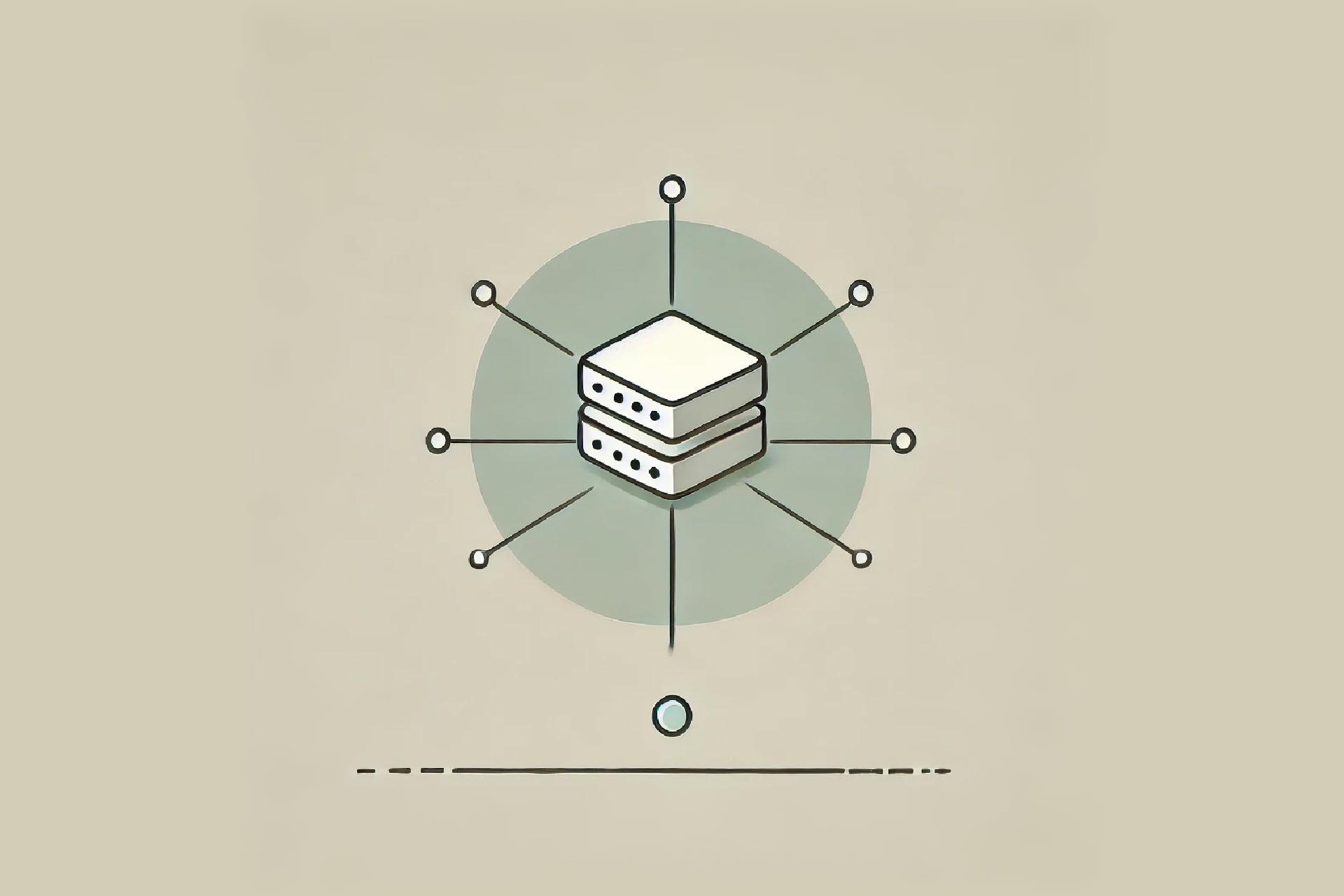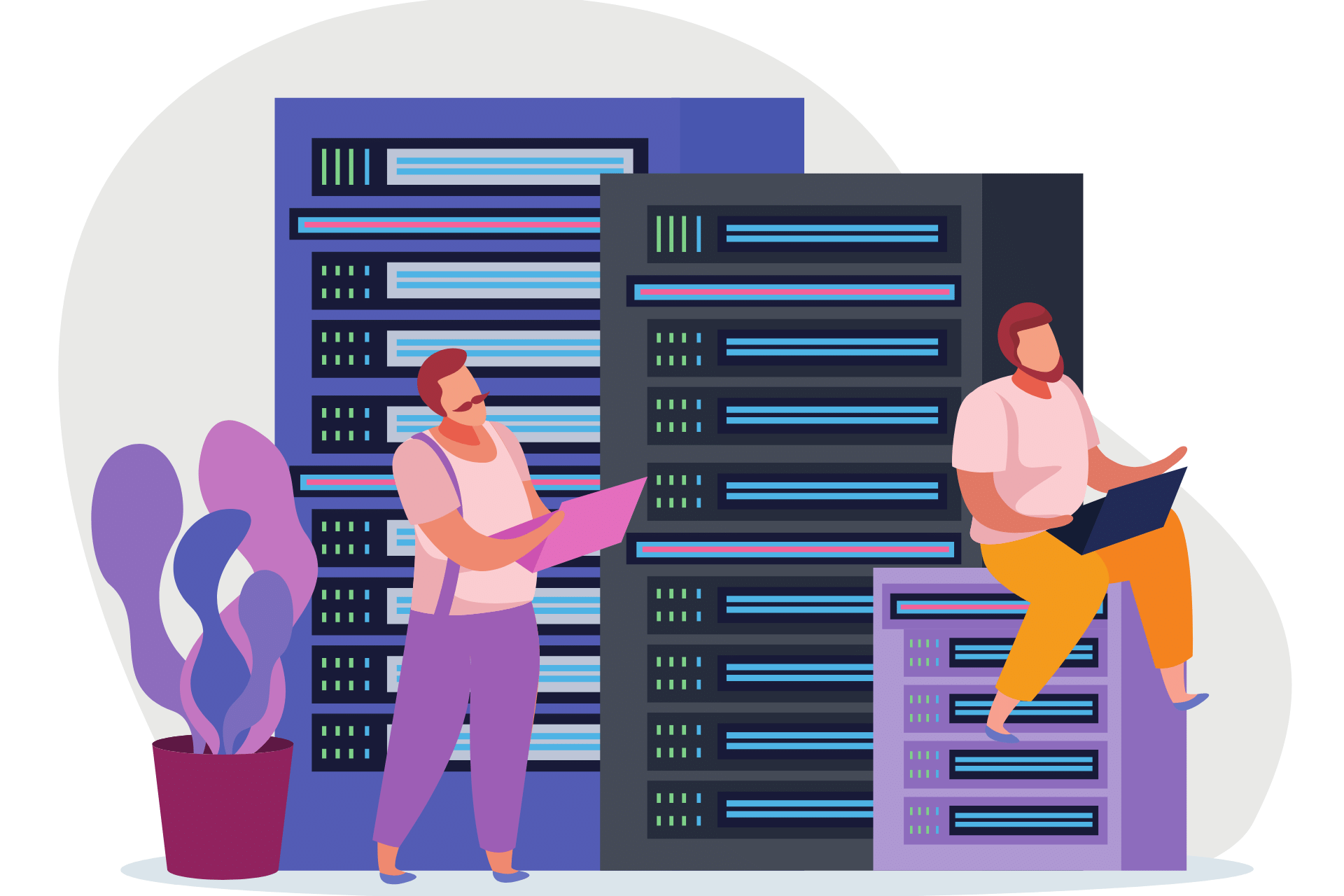Tech professionals and entrepreneurs rely on flexible and efficient hosting services to achieve online business success. Choosing the right hosting option provides a seamless online experience for users with minimal downtime and performance issues.
VPS and dedicated servers are two of the most common types of hosting services for individuals and businesses today. They help them reach a wider audience and ensure online safety with specifically tailored solutions for hosting, securing, and customizing their websites and platforms.
This article explains the difference between VPS and dedicated servers, their advantages and challenges, and lists tips on how to choose the best option for your business.

What Is a VPS (Virtual Private Server)?
A VPS (virtual private server) acts as a dedicated server within a larger physical server. It allocates a portion of the server’s resources, such as RAM, CPU, and storage, to a specific user through server virtualization technology. Each user receives a certain number of resources that are separate from others’ resources but within the same physical server.
Despite sharing the hardware, each VPS operates in its own separate environment and operating system (OS). This gives them a higher level of control, flexibility, and customization compared to shared hosting and at a lower cost than a dedicated server. A VPS is highly adaptable, and users can add more resources (storage, processing power, etc.) if necessary, as long as they are within the capabilities of the main server.
What Is a Dedicated Server?
A dedicated server is a server used by only one user (an individual or a business). It does not share resources, such as RAM, CPU, bandwidth, or storage, with other entities. Instead, they are allocated to a single user’s applications and websites to ensure optimal performance, security, and full control over software configuration.
Businesses with high-traffic websites or specialized server requirements favor using dedicated servers due to their resource availability and customization possibilities. Dedicated servers don’t allow other users to access your resources and, therefore, provide unequaled performance. However, because of this, dedicated servers come at higher costs than VPS.
Learn how to calculate the bandwith requirements of a website or web-based application.
Pros and Cons of VPS
Pros
The benefits of using a VPS include:
- Cost efficiency: A VPS does not require a huge investment since the server space is shared with other users.
- Scalability: A VPS allows users to easily adjust their partition to fit more storage or a higher processing speed, depending on their changing workloads.
- Fast deployment: Setting up a VPS with a major commercial service provider is quick and often completed in minutes.
- Some configurability: A VPS allows users to configure most parts of the server to suit their needs. This does not include changing the main server’s hardware.
- Isolation: A VPS guarantees complete isolation from other users within the shared server, so the performance of one usually does not affect the rest.
Cons
On the other hand, there are some disadvantages to using a VPS:
- Limited resources: Users can upgrade their partitions in their VPS, but only within the confines of the main physical server.
- Congestion issues: Some providers oversell the server to more users than it can hold, which results in poor performance.
- Lack of experience: Users must manage their own virtual environment within the main server, which can be challenging if they do not have experience and know-how.
- Hardware failures: Despite having their own virtual environment, all users are equally susceptible to hardware issues.
- Security: Despite the VPS being isolated, occasionally a threat bypasses the hypervisor and affects all users.
- Performance inconsistencies: Not all VPS solutions are configured the same, which affects the performance of your website or platform.
Discover 7 ways to reduce server response times.
Pros and Cons of Dedicated Servers
Pros
Here is a list of the benefits of dedicated servers:
- Exceptional performance: Dedicated servers allocate all resources to a single user, providing unmatched performance with no downtime.
- Unlimited customization options: Unlike VPS, dedicated servers allow users to fully customize all parts of their server environment, including software, security, and other elements.
- Advanced security: With no other users on the server, there are fewer risks of data breaches.
- Reputation management: Dedicated servers provide separate IP addresses to each user, which helps them obtain SSL certificates and maintain an image of security and reliability.
- Hardware configuration: Unlike VPS, dedicated servers allow users to tailor their hardware solutions to fit their business needs.
- Reliability and consistency: Since dedicated servers do not share users, there are no risks of their system issues affecting your performance.
Cons
Keep in mind these downsides of dedicated servers:
- Higher costs: Dedicated servers come with more expenses than VPS due to the exclusivity of the hardware and resources.
- Deployment speed: Setting up a dedicated server can take from hours to days as the provider configures the hardware, OS, etc., to suit the needs of the user.
- Maintenance responsibilities: Users are responsible for software updates, system patches, and creating backups, which requires a higher level of expertise.
- Complex scaling: Adding RAM or storage on a dedicated server requires some downtime and is more complex than with a VPS.
- Unsatisfying cost-to-performance ratio: If a dedicated server is underutilized, you are paying for more than you are using and essentially wasting resources, both financial and operational.
- Single point of failure: On its own, a dedicated server lacks automatic failover and redundancy to call on if a part of the system crashes. This affects the flow of your business operations and causes downtime, as all issues must be resolved manually.
phoenixNAP’s Bare Metal Cloud Servers are quick to set up, flexible, scalable, and transparently billed. We have over 40 pre-configured instances that you can deploy in minutes and at various global locations.
VPS vs. Dedicated Server: Detailed Comparison

Here is a detailed comparison of VPS and dedicated servers’ capabilities.
Configuration
A VPS is configured within the main server, with each user getting a designated portion of resources. These resources can be organized in any way the users see fit, but this is limited by the configuration abilities of the main server.
A dedicated server has no configuration limitations. Users have full control over customizing hardware and software and adding or removing components based on their needs and workloads.
Performance
A VPS provides better performance compared to shared hosting due to resource allocation. However, despite each user getting an isolated VPS within the same main server, the performance issues of one user sometimes affect others and cause downtime.
A dedicated server guarantees peak performance since users do not share their virtual space with anyone else. Any performance failures that might occur are the result of their own mismanagement of the dedicated server or due to outside security threats.
Preventing performance failures involves being one step ahead of security threats. Take server security to the next level with our list of 21 server security tips.
Resource Allocation
A VPS allocates resources like CPU, RAM, and storage from a larger physical server using virtualization technologies. Each VPS receives a specific portion of these resources and operates independently from other virtual entities on the same main server. However, the overall capacity and performance of each VPS are bound by the limitations of the main server they reside on.
With dedicated servers, all resources are allocated to a single user, allowing them to manage and configure the server to fit their business needs and workloads without external limiting factors. The full resource allocation guarantees a more consistent performance of websites and platforms.
Security
A VPS operates within its own isolated virtual environment, which offers an additional layer of security compared to shared hosting. However, all entities on the main server share the same hardware and hypervisor, so if one is affected by outside threats, the security of others is also jeopardized.
A dedicated server eliminates the risks and vulnerabilities of one user on the same server spilling over and affecting others. The user has full control over security protocols and monitoring systems, which provides more robust protection against security threats.
Customization
A VPS allows users to customize their virtual environment in terms of choosing an operating system, software, and system settings. However, these choices are limited by the parameters of the hosting provider.
A dedicated server provides unlimited customization options and full control over hardware and software. Depending on their server needs, users can choose each component, from RAM and storage to specialized configurations.
Scalability
A VPS is quickly scalable as workloads grow since users can upgrade their VPS packages within the main server’s infrastructure. However, they cannot go beyond the capacity of the physical server.
A dedicated server offers unlimited scaling, but this comes with downtime that disrupts the business flow. When the need for more resources arises, there is no option to simply switch to a better subscription package, like with a VPS. Instead, users must manually upgrade their server, which requires time and skill.
Price
The pricing for VPS depends on the allocated resources, and providers typically offer different tiers to satisfy the needs of a broad audience. The cost of a VPS falls between shared hosting and dedicated servers.
Dedicated servers are more expensive than VPS due to the exclusivity of resources. For this reason, they are better suited to users who prioritize performance, security, scalability, and the ability to fully customize their server environment.
Compare the PhoenixNAP pricing structure of dedicated servers and find the most suitable one for your business.
VPS vs. Dedicated Server: A Quick Comparison
Here is an overview of the capabilities VPS and dedicated servers offer users.
| VPS | Dedicated Servers | |
| Configuration | Limited by the main server’s capabilities | Unlimited |
| Performance | May be affected by other users on the main server | Completely isolated and affected only by the user’s management or outside factors |
| Resource Allocation | Shared resources allocated from the main server | Complete resource utilization by a single user on the server |
| Security | More secure than shared hosting | More secure than VPS |
| Customization | Limited by the main server’s capabilities | Unlimited |
| Scalability | Limited by the main server’s capabilities but quick | Unlimited but time-consuming, may cause downtime |
| Price | More expensive than shared hosting but less than dedicated servers | More expensive than VPS |
VPS vs. Dedicated Server: How to Choose?
A VPS is a smart option for individuals and businesses that have outgrown shared hosting but are not yet ready to invest in a dedicated server. A VPS is a great intermediate option as it balances affordability and flexibility. It is suitable for small and medium-sized businesses with moderate traffic or developers who need isolated environments for testing.
On the other hand, a dedicated server is a great solution for individuals and businesses with resource-hungry web projects and applications that require peak performance, unlimited customization, and full control over the hosting environment. This option is suitable for high-traffic websites, large online platforms, and companies that handle highly sensitive data and require robust security.
Healthcare organizations must comply with HIPAA regulation that protects patient data. phoenixNAP provides HIPAA-ready hosting solutions that enforce the highest security standards while remaining flexible and optimized for performance.
Navigating the Server Showdown
When choosing the right hosting solution for your business, carefully assess the performance, configuration options, and security you need and how much you are prepared to pay for them. A VPS is one step above shared hosting, suitable for small and medium businesses that do not require a lot of scaling or resources. On the other hand, a dedicated server is a smart solution for businesses and individuals who require complete control over their hosting environment, impeccable performance, and unlimited customization and configuration capabilities.
Next, learn how dedicated hosting compares to other hosting solutions by reading our posts Shared Hosting vs. Dedicated Hosting and Cloud Server vs. Dedicated Hosting.



